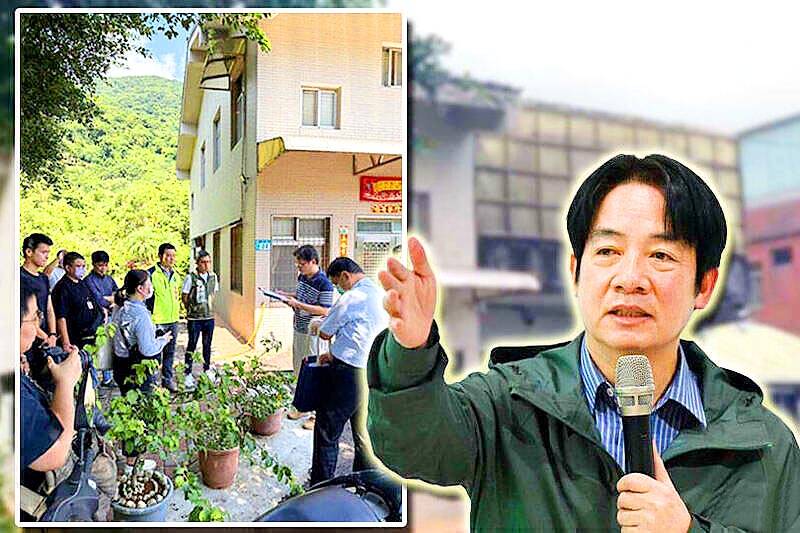President William Lai’s (賴清德) family home in New Taipei City has been turned into a miners’ museum and is to be open to the public for free from October, the Democratic Progressive Party (DPP) announced on Tuesday.
The property in Wanli District (萬里), as well as the nearby Liukeng coal mine and the ruins of its office, would form a cultural park aimed at educating the public about Taiwan’s mining history, the DPP told a news conference.
Reservations would be required and up to 20 people each on Fridays, Saturdays and Sundays would be allowed to visit, the DPP said.

Photo: Chen Cheng-yu, Taipei Times
In addition to an exhibition of photographs documenting miners’ lives, visitors would also have access to guided tours and oral history activities, it said.
In a Facebook post later on Tuesday, Lai encouraged the public to visit the site, which he said would “foster mutual understanding and help unify Taiwan.”
The property was at the center of controversy during Lai’s campaign leading up to the presidential election on Jan. 13.
The Chinese Nationalist Party (KMT) and the Taiwan People’s Party accused Lai’s family of illegally expanding the property and said that the building should have been torn down by the New Taipei City government years ago.
Lai said at the time that the house is one of hundreds of renovated miners’ units built decades ago in New Taipei City, where there used to be several mining districts.
However, mining companies closed and many of the original units were purchased and renovated for safety reasons, he said.
The units predate the Regional Planning Act (區域計畫法), which prohibits unauthorized expansion, he said.
Despite believing that the property does not contravene regulations, Lai said he was sorry that it became an issue during the presidential race and jeopardized the rights of residents living in similar units.
To commemorate the contributions made by miners to Taiwan’s economic growth in the past century, Lai late last year pledged that he would transfer the rights of the Wanli property to a charitable trust and prioritize turning it into a miners’ museum.

South Korean K-pop girl group Blackpink are to make Kaohsiung the first stop on their Asia tour when they perform at Kaohsiung National Stadium on Oct. 18 and 19, the event organizer said yesterday. The upcoming performances will also make Blackpink the first girl group ever to perform twice at the stadium. It will be the group’s third visit to Taiwan to stage a concert. The last time Blackpink held a concert in the city was in March 2023. Their first concert in Taiwan was on March 3, 2019, at NTSU Arena (Linkou Arena). The group’s 2022-2023 “Born Pink” tour set a

CPBL players, cheerleaders and officials pose at a news conference in Taipei yesterday announcing the upcoming All-Star Game. This year’s CPBL All-Star Weekend is to be held at the Taipei Dome on July 19 and 20.

The Taiwan High Court yesterday upheld a lower court’s decision that ruled in favor of former president Tsai Ing-wen (蔡英文) regarding the legitimacy of her doctoral degree. The issue surrounding Tsai’s academic credentials was raised by former political talk show host Dennis Peng (彭文正) in a Facebook post in June 2019, when Tsai was seeking re-election. Peng has repeatedly accused Tsai of never completing her doctoral dissertation to get a doctoral degree in law from the London School of Economics and Political Science (LSE) in 1984. He subsequently filed a declaratory action charging that

The Hualien Branch of the High Court today sentenced the main suspect in the 2021 fatal derailment of the Taroko Express to 12 years and six months in jail in the second trial of the suspect for his role in Taiwan’s deadliest train crash. Lee Yi-hsiang (李義祥), the driver of a crane truck that fell onto the tracks and which the the Taiwan Railways Administration's (TRA) train crashed into in an accident that killed 49 people and injured 200, was sentenced to seven years and 10 months in the first trial by the Hualien District Court in 2022. Hoa Van Hao, a